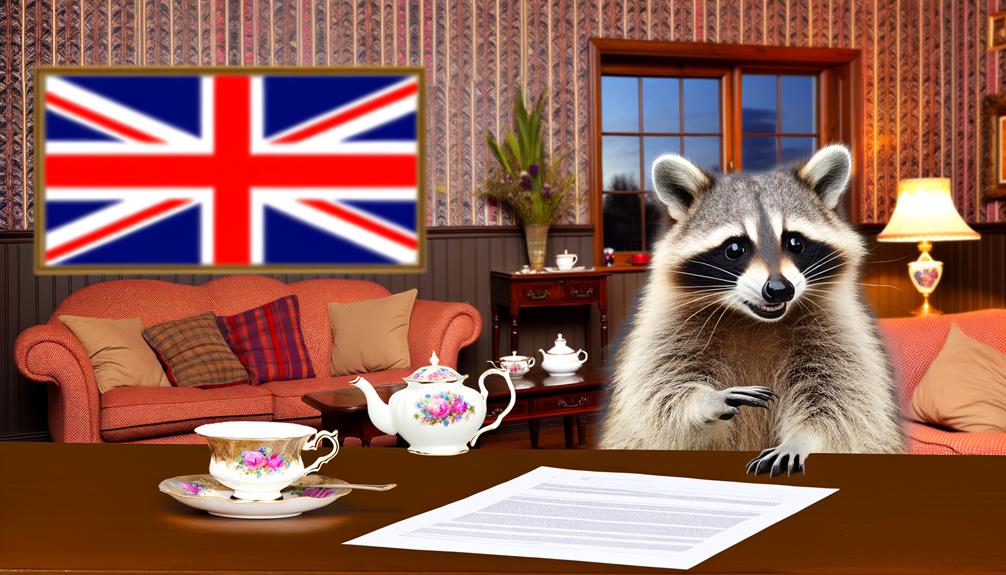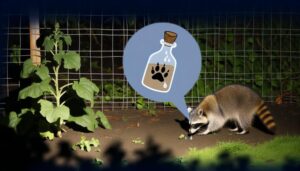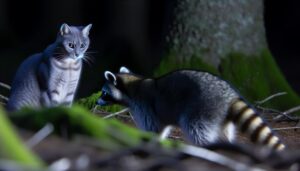Guide to Legally Owning Pet Raccoons in the UK
Owning a pet raccoon in the UK is regulated by the Dangerous Wild Animals Act 1976. Prospective owners must obtain a Dangerous Wild Animals (DWA) license from their local council.
This requires demonstrating secure accommodation, public safety measures, and adequate knowledge of raccoon care. Non-compliance can result in penalties, fines, or confiscation of the animal.
Additionally, raccoons are classified as an invasive species under the Wildlife and Countryside Act 1981, necessitating strict containment to mitigate their environmental impact. Understanding the thorough legal and ethical responsibilities is essential for compliance and responsible ownership.
Discover the detailed steps and requirements involved.

Key Takeaways
- Owning a pet raccoon in the UK requires a Dangerous Wild Animals (DWA) license from the local council.
- Raccoons are classified as invasive species under the Wildlife and Countryside Act 1981.
- There are strict regulations and inspection protocols for housing and caring for raccoons.
- Non-compliance with the licensing requirements can lead to penalties, fines, and confiscation of the raccoons.
- Owners must ensure public safety, secure accommodation, and adequate care knowledge for raccoon ownership.
Understanding UK Pet Laws
The regulatory framework governing the ownership of exotic pets, including raccoons, in the UK is primarily outlined in the Dangerous Wild Animals Act 1976. This Act mandates that individuals obtain a specific license from their local council to legally keep certain wild animals as pets.
The licensing process involves stringent criteria, such as ensuring that the animal's accommodation is secure and suitable to prevent escape and safeguard public safety. Owners must also demonstrate adequate knowledge and capability to care for the species in question.
Failure to comply with these regulations can result in significant penalties, including fines and confiscation of the animal. This legislative measure underscores the UK's commitment to both animal welfare and public safety.
Definition of Exotic Pets
Exotic pets are defined as non-domesticated animals that are not traditionally kept as household pets, including species such as raccoons.
The legal considerations surrounding the ownership of exotic pets in the UK are governed by specific regulations, including the Dangerous Wild Animals Act 1976.
This legislation aims to guarantee that such animals are housed in conditions that protect both the animal and public safety.
Exotic Pets Overview
An exotic pet is typically defined as a non-traditional companion animal that is not commonly kept in households, often requiring specialized care and environments. These animals diverge significantly from conventional pets like cats and dogs, necessitating a more profound understanding of their unique needs.
Key characteristics of exotic pets include:
- Unique dietary requirements: Many exotic pets have specific nutritional needs that are essential for their health.
- Specialized habitat needs: Proper housing often mimics their natural environment to guarantee their well-being.
- Behavioral considerations: Understanding their natural behaviors is vital for effective care.
- Veterinary care: Exotic pets often require veterinarians with specialized training.
- Legal regulations: Ownership is frequently governed by strict laws and guidelines to ensure ethical treatment.
This overview underscores the complexity of caring for exotic pets, emphasizing the importance of informed and responsible ownership.
Legal Considerations
Frequently, the legal framework surrounding exotic pet ownership is intricate, varying greatly across different regions and often influenced by considerations of animal welfare, public safety, and environmental impact.
In the United Kingdom, the term 'exotic pets' encompasses species not traditionally domesticated, including raccoons. Legislation such as the Dangerous Wild Animals Act 1976 and the Animal Welfare Act 2006 plays a critical role. The former requires licenses for keeping certain species, ensuring public safety and proper care standards.
The latter mandates that all animals, including exotics, receive appropriate welfare. Importantly, the specific classification of raccoons under these regulations necessitates careful examination to determine legality.
Compliance with these statutes is essential for prospective exotic pet owners committed to serving animal welfare and public safety.
Legal Status of Raccoons
The legal status of raccoons in the UK is governed by specific regulations that classify them as an invasive species under the Wildlife and Countryside Act 1981. This classification imposes stringent controls on their ownership, management, and movement.
Key regulatory aspects include:
- Licensing Requirements: Owners must obtain appropriate licenses to keep raccoons legally.
- Containment Obligations: Strict guidelines mandate secure enclosures to prevent escape.
- Environmental Impact: Raccoons are considered a threat to native wildlife and ecosystems.
- Legal Penalties: Non-compliance with regulations can result in severe fines or legal actions.
- Import Restrictions: Importing raccoons is highly regulated to prevent ecological imbalances.
These measures are essential to mitigate the potential adverse effects raccoons pose to biodiversity and public safety.
Dangerous Wild Animals Act
The Dangerous Wild Animals Act 1976 imposes strict regulations on the ownership of raccoons in the UK, categorizing them as a species requiring a specialized license. Owners must adhere to stringent licensing requirements and demonstrate their capacity to guarantee the animals' welfare and public safety.
Additionally, the Act mandates thorough responsibilities for owners, including appropriate housing, veterinary care, and measures to prevent escapes.
Licensing Requirements
In the UK, owning a pet raccoon requires adherence to the Dangerous Wild Animals Act, which mandates obtaining a specific license. This legislation guarantees that raccoon owners meet strict criteria to safeguard the safety and welfare of both the animal and the public.
To obtain a license, applicants must demonstrate:
- Adequate and secure housing that prevents escape.
- Proper veterinary care arrangements, including routine health checks.
- Thorough knowledge of raccoon behavior and care requirements.
- Sufficient liability insurance to cover potential risks and damages.
- Compliance with local authority inspections and regulations.
These measures are designed to protect public safety and ensure the well-being of raccoons. Adhering to these requirements reflects a commitment to responsible pet ownership and public service.
Species Classification
Recognizing the inherent risks associated with keeping raccoons, the Dangerous Wild Animals Act categorizes them as species that require stringent regulatory oversight. This classification is based on evidence indicating that raccoons can pose significant health and safety risks to humans and other animals.
Specifically, raccoons are known carriers of zoonotic diseases, such as rabies and leptospirosis, which can be detrimental to public health. The Act mandates that anyone wishing to keep raccoons must obtain a license and adhere to specific conditions designed to mitigate these risks.
This legislative framework reflects a commitment to safeguarding both animal welfare and public safety, ensuring that raccoons are kept in environments that minimize potential hazards.
Owner Responsibilities
Owners of raccoons under the Dangerous Wild Animals Act must comply with strict regulatory requirements to guarantee public safety and animal welfare. This legislation mandates that raccoon owners adhere to detailed guidelines, ensuring both the security of the community and the well-being of the animals.
Key responsibilities include:
- Licensing: Securing a proper license from the local authority.
- Housing: Providing enclosures that meet specific safety standards.
- Insurance: Maintaining adequate public liability insurance.
- Inspection: Allowing regular inspections by relevant authorities.
- Health Care: Ensuring raccoons receive appropriate veterinary care.
These measures are in place to mitigate risks associated with keeping raccoons, which are classified as dangerous wild animals, and to foster a responsible ownership environment. Adhering to these requirements is essential for the safeguarding of both humans and raccoons.
Licensing Requirements
To legally own a pet raccoon in the UK, prospective owners must obtain a specific license under the Dangerous Wild Animals Act 1976. This legislation mandates that individuals demonstrate adequate knowledge and capability to guarantee the animal's safe and humane care.
Applicants must provide detailed information regarding the housing, diet, and veterinary care intended for the raccoon. Local authorities are responsible for issuing these licenses, contingent upon a satisfactory inspection of the premises where the raccoon will be kept.
The license must be renewed periodically, ensuring continued compliance with regulatory standards. Failure to secure the appropriate license can result in legal repercussions, including fines and confiscation of the animal.
This regulatory framework aims to balance the interests of animal welfare with public safety.
Animal Welfare Considerations
Ensuring the well-being of raccoons in captivity requires a thorough understanding of their natural behaviors, dietary needs, and environmental requirements. As nocturnal foragers, raccoons have specific needs that must be met to thrive in a domestic setting.
Key considerations include:
- Dietary Needs: A balanced diet replicating their natural intake, including fruits, vegetables, and proteins.
- Enclosure Specifications: Spacious, secure habitats to allow for climbing and exploration.
- Environmental Enrichment: Regular mental and physical stimulation to prevent boredom and stress.
- Social Needs: Opportunities for social interaction, either with other raccoons or human caretakers.
- Veterinary Care: Access to specialized veterinary services familiar with raccoon health and behavior.
Meeting these requirements is essential for the ethical treatment of raccoons in captivity.
Health Risks and Concerns
The presence of pet raccoons in the UK poses significant health risks, including the potential for disease transmission and zoonotic infections. Studies indicate that raccoons can carry pathogens such as rabies and leptospirosis, which can be transmitted to humans.
Additionally, individuals may experience allergic reactions to raccoon dander, fur, or saliva, necessitating further examination of these health concerns.
Disease Transmission Risks
Among the primary health risks associated with keeping pet raccoons in the UK is the potential for zoonotic disease transmission. Given raccoons' propensity to harbor pathogens that can be transferred to humans, it is essential to understand the associated risks. These concerns are substantiated by empirical research and epidemiological studies.
Rabies: Raccoons are known carriers, posing a significant public health risk.
Baylisascaris procyonis: This parasitic infection can lead to severe neurological damage in humans.
Leptospirosis: Spread through contact with raccoon urine, this bacterial disease can cause kidney damage and liver failure.
Salmonella: Transmission through fecal contamination, leading to gastrointestinal illnesses.
Giardiasis: A parasitic infection causing severe digestive issues.
Each of these diseases underscores the need for stringent health and safety measures.
Zoonotic Infections Potential
Zoonotic infections from pet raccoons present significant health risks due to their ability to transmit a variety of pathogens to humans. These animals are known carriers of rabies, a fatal viral disease affecting the central nervous system.
Additionally, raccoons can harbor Baylisascaris procyonis, a parasitic roundworm causing severe neurological damage if ingested. Leptospirosis, a bacterial infection that can lead to kidney damage, liver failure, and respiratory distress, is also a concern.
The transmission of these pathogens occurs through direct contact with raccoon saliva, urine, feces, or contaminated surfaces. The increasing prevalence of these zoonotic infections underscores the importance of stringent public health measures and responsible pet ownership, ensuring the safety of both pet owners and the wider community.
Allergic Reactions Possibility
Beyond zoonotic infections, pet raccoons also pose a significant risk of inducing allergic reactions in susceptible individuals. Allergic reactions can be triggered by various allergens associated with raccoons, including dander, saliva, and urine. These allergens can worsen respiratory conditions such as asthma or contribute to the development of allergic rhinitis.
Potential allergic reactions include:
- Respiratory issues: Difficulty breathing, wheezing, and coughing.
- Skin reactions: Contact dermatitis, characterized by itching, redness, and swelling.
- Ocular symptoms: Itchy, watery, and red eyes.
- Anaphylaxis: A severe, potentially life-threatening allergic reaction.
- Chronic symptoms: Persistent nasal congestion, sneezing, and sinusitis.
Given these health risks, individuals prone to allergies should practice caution when considering raccoons as pets to guarantee the well-being of all household members.
Environmental Impact
The introduction of pet raccoons into the UK ecosystem poses significant risks to native wildlife and habitats. Raccoons are known to be opportunistic feeders, potentially leading to the depletion of food resources for indigenous species. Their foraging behavior can disturb nesting sites and destroy vegetation, causing ecological imbalance.
Moreover, raccoons can be vectors for diseases such as rabies and canine distemper, which could spread to local fauna and domestic pets. Studies from regions where raccoons have been introduced indicate a decline in native bird populations and increased competition for nesting sites. The potential for raccoons to escape captivity and establish feral populations underscores the need for stringent regulations to protect the UK's biodiversity.
Ethical Considerations
In evaluating the ethical considerations of keeping raccoons as pets in the UK, it is essential to weigh the welfare of the animals against potential ecological and public health risks.
Ethical dilemmas arise from the challenges in replicating a raccoon's natural habitat and behaviors in a domestic setting. Additionally, the broader societal implications must be considered.
- Animal Welfare: Compromised due to inadequate living conditions and unmet behavioral needs.
- Ecological Balance: Potential disruptions if raccoons escape and establish non-native populations.
- Public Health: Risk of zoonotic diseases transmitted from raccoons to humans.
- Moral Responsibility: Ethical duty to prevent suffering and promote the well-being of sentient beings.
- Regulatory Compliance: Ensuring adherence to animal welfare laws and guidelines.
These considerations necessitate a thoughtful approach to the issue.
Alternatives to Raccoons
Given the ethical concerns associated with keeping raccoons as pets in the UK, exploring alternative species that align more closely with humane and ecological standards becomes imperative. Several domestic and exotic animals can serve as suitable substitutes, providing companionship without compromising ethical or environmental principles.
| Alternative Species | Advantages | Considerations |
|---|---|---|
| Ferrets | Playful, social | Special dietary needs |
| Guinea Pigs | Low maintenance, friendly | Sensitive to temperature changes |
| Rats | Intelligent, affectionate | Short lifespan |
| Hedgehogs | Quiet, low allergenic risk | Requires specific habitat setup |
Each of these alternatives offers unique benefits, ensuring that the welfare of both the pet and the owner is upheld. This approach promotes responsible pet ownership and biodiversity conservation.
Steps to Legal Ownership
Acquiring legal ownership of a pet raccoon in the UK requires moving through a series of stringent regulatory steps designed to guarantee animal welfare and environmental protection. These measures secure that both the raccoon and the broader ecosystem are safeguarded.
Prospective owners must adhere to the following:
- Licensing Requirements: Obtain a Dangerous Wild Animals (DWA) license from the local council.
- Inspection Protocols: Pass a thorough inspection by an appointed veterinary officer.
- Habitat Specifications: Provide an appropriate and secure enclosure that meets specific welfare standards.
- Health Checks: Ensure the raccoon undergoes regular veterinary examinations and vaccinations.
- Insurance Mandates: Secure adequate public liability insurance to cover potential risks associated with keeping a raccoon.
Adhering to these steps secures responsible and lawful raccoon ownership.
Conclusion
In summation, the legal landscape surrounding raccoons as pets in the UK is intricate and restricted. Stringent statutes such as the Dangerous Wild Animals Act impose rigorous requirements and restrictions.
The environmental impact and ethical considerations further complicate the issue. Prospective pet owners should ponder alternative options that are less troublesome.
Thorough understanding and compliance with licensing laws are essential for those contemplating the ownership of raccoons.






